
The Politics of Persecution
Author(s): Melani McAlister
Source: MiddleEastReport, No. 249, Shrinking Capital: The US in the Middle East (Winter, 2008), pp. 18-27
Published by: Middle East Research and Information Project (MERIP)
Stable URL: http://www.jstor.org/stable/25164876
Accessed: 18/08/2013 19:02
Your use of the JSTOR archive indicates your acceptance of the Terms & Conditions of Use, available at . http://www.jstor.org/page/info/about/policies/terms.jsp
. JSTOR is a not-for-profit service that helps scholars, researchers, and students discover, use, and build upon a wide range of content in a trusted digital archive. We use information technology and tools to increase productivity and facilitate new forms of scholarship. For more information about JSTOR, please contact support@jstor.org.

Middle East Research and Information Project (MERIP) is collaborating with JSTOR to digitize, preserve and extend access to Middle East Report.
http://www.jstor.org
This content downloaded from 198.91.37.2 on Sun, 18 Aug 2013 19:02:40 PM All use subject to JSTOR Terms and Conditions

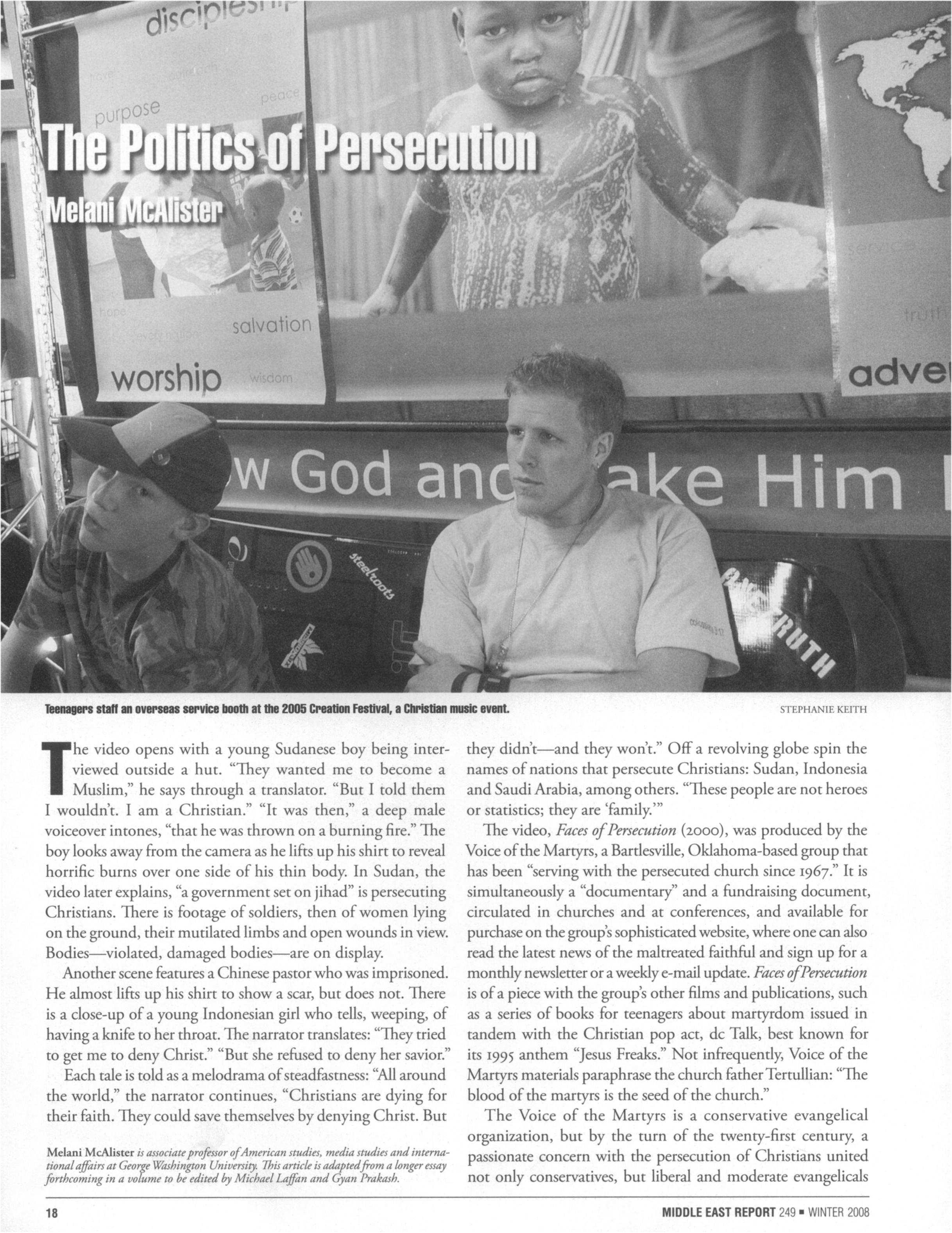
The video opens with a young Sudanese boy being inter viewed outside a hut. "They wanted me to become a Muslim," he says through a translator. "But I told them Iwouldn't. I am a Christian." "It was then," a deep male voiceover intones, "that he was thrown on a burning fire." The boy looks away fromthecamera as he liftsup his shirtto reveal horrific burns over one side of his thin body. In Sudan, the video later explains, "a government set on jihad" ispersecuting Christians. There isfootage of soldiers, thenofwomen lying on the ground, theirmutilated limbs and open wounds inview. Bodies?violated, damaged bodies?are on display.
Another scene features aChinese pastor who was imprisoned. He almost liftsup his shirtto show a scar,but does not.There isa close-up of a young Indonesian girlwho tells,weeping, of having a knife toher throat. The narrator translates: "They tried to get me to deny Christ." "But she refused to deny her savior."
Each tale istoldas amelodrama of steadfastness:"Allaround theworld," the narrator continues, "Christians are dying for theirfaith.They could save themselvesbydenyingChrist. But
Melani McAlister isassociateprofessorofAmerican studies,media studiesand interna tionalaffairsatGeorgeWashingtonUniversity.Thisarticleisadaptedfroma longeressay forthcoming ina volumetobeeditedbyMichael LaffanandGyanPrakash.
theydidn't?and theywon't."
Off a revolving globe spin the names of nations that persecute Christians: Sudan, Indonesia and Saudi Arabia, among others. "These people are not heroes or statistics; they are 'family.'"
The video, Faces ofPersecution (2000), was produced by the Voice of theMartyrs, aBartlesville,Oklahoma-based group that has been "servingwith thepersecuted church since 1967." It is simultaneously a "documentary" and a fundraising document, circulated in churches and at conferences, and available for purchase on the group's sophisticated website, where one can also read the latestnews of themaltreated faithfuland signup fora monthly newsletter or aweekly e-mail update. Faces ofPersecution isof a piecewith thegroup's other filmsand publications, such as a series of books for teenagers about martyrdom issued in tandemwith theChristian pop act, dc Talk, best known for its 1995anthem "JesusFreaks."Not infrequently,Voice of the Martyrs materials paraphrase thechurch fatherTertullian: "The blood of themartyrs isthe seed of thechurch."
The Voice of theMartyrs is a conservative evangelical organization, but by the turn of the twenty-first century, a passionate concern with the persecution of Christians united not only conservatives, but liberal and moderate evangelicals
18MIDDLEEASTREPORT249 WINTER2008
iVI I i"""^ M^ ll Ell PT\ We I I BB _P^ i"""^pifv i I"""!Fill I i I K JtSz^^JSurSMi_-?___l___^^^^__^_^____l^iS^H^_^_^_^_^_^_B^^ai^^iM^i^_M-iMiin_SJW_i i i 11 j i J I IL i Jf J II I JI A _1_i!I [ J 11 'jffisxQ^^KKFr^^KMKBI^^K'"'SlilliliiiBB_d -*%_BI, .n|^Bfl^^^^^^^^^^^|^^^^^^5H-__-_-_-_-_-_-_-_-_-_-_-_^^^^^B__B_______P^^BF^lf jf ' ^^_________________________________________________ ^'__V_l ii9_^_Vi_^_^_^_^_^_^_^_^_^_^_^_^_^_^_^_^_^_^_B_M_^_^_^_^!!BH^^^^^^^^^^^^^^^^^^^^ii_9SI__E_Hr - v*#p f ? Jf ,< ' ^__^__^__^__^__^__^__^__^__i__^__^__^__^__^____^__^__l_^__^__i j^^jjili^MJ^^^^^^^^^^^^^^B^^^^^^MBjj^^^^^^^^^^^^F -liliiy fr ^__________________________________________________ *_^v_^_^_^_^_^_^_^_^_^_^_^_l_^_^_^_^_^_^_^_^_^_^_^_^_^_^_^_^_^_H^_^_^_^_^_^_^_^_^_^_^_i !i^>#w_^__^__^__^__^__^__^__^__^__^__^__l_^^i^__^__^__^__^__^__^__^__^__^__V_^__^__^__^__^__^__^__^__^__^__^__^__^__^__^_i_l_^__^__^__^__^__^__^__^__^__i v -*&3! m y^ __I^__^__^__^__^__^__^__^__^__^__^__^__^__H r J^_-_-_B9^_-_-_-_-_-_-_-_-_B_-_-_-_-_-_-_-_-_-_-_-_-_-_-_-_-_-_-___ ' J :V: __\_r7^_-_-_-_-_-_-_-_-_-_-_-_-_-_-_-_-_-_-_-_-___i
Teenagers staffanoverseas service boothatthe2005 CreationFestival,aChristianmusic event. Stephanie keith
This content downloaded from 198.91.37.2 on Sun, 18 Aug 2013 19:02:40 PM All use subject to JSTOR Terms and Conditions
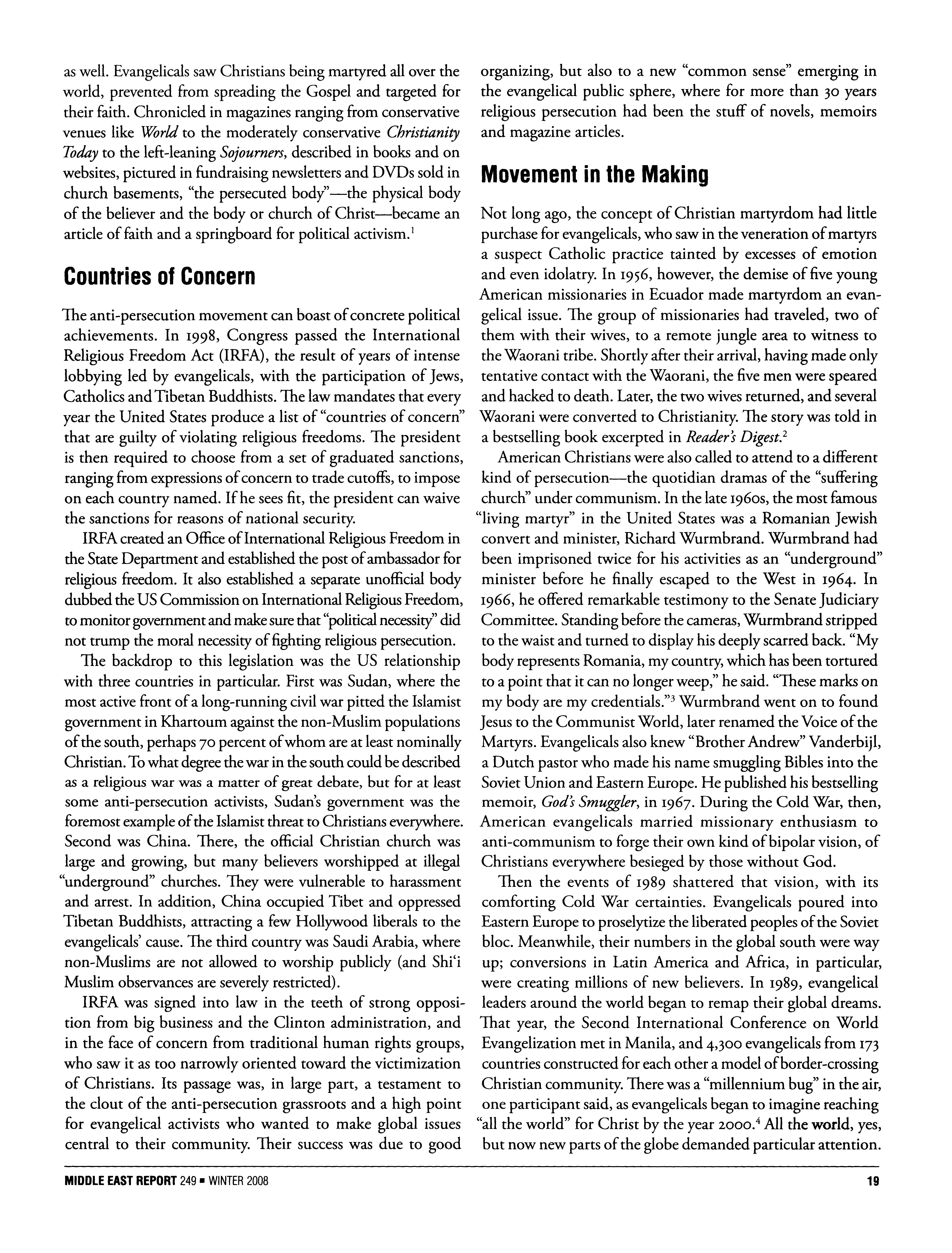
aswell. Evangelicals sawChristians beingmartyred all over the world, prevented from spreading theGospel and targetedfor theirfaith.Chronicled inmagazines rangingfromconservative venues likeWorld to themoderately conservativeChristianity Today to the left-leaningSojourners,described inbooks and on websites, pictured infundraisingnewslettersandDVDs sold in church basements, "thepersecuted body"?the physical body of thebeliever and thebody or church ofChrist?became an articleof faithand a springboard forpolitical activism.1
CountriesofConcern
The anti-persecution movement can boast of concrete political achievements. In 1998, Congress passed the International Religious Freedom Act (IRFA), the resultof years of intense lobbying led by evangelicals, with the participation of Jews, Catholics andTibetan Buddhists. The lawmandates thatevery year theUnited States produce a listof "countries of concern" that are guilty of violating religious freedoms. The president is then required to choose from a setof graduated sanctions, ranging from expressions of concern to trade cutoffs, to impose on each countrynamed. Ifhe sees fit,thepresident canwaive the sanctions for reasons of national security.
IRFA createdanOffice of InternationalReligious Freedom in theStateDepartment and established thepost of ambassador for religiousfreedom. It also established a separateunofficialbody dubbed theUS Commission on InternationalReligious Freedom, tomonitor governmentandmake surethat"politicalnecessity"did not trump themoral necessityoffightingreligiouspersecution.
The backdrop to this legislationwas theUS relationship with threecountries inparticular. Firstwas Sudan, where the most active frontof a long-runningcivilwar pitted the Islamist government inKhartoum against the non-Muslim populations of thesouth,perhaps 70 percent ofwhom areat leastnominally Christian.To what degree thewar inthesouthcould be described as a religious war was amatter of great debate, but for at least some anti-persecution activists, Sudan's government was the foremost example of the Islamist threat toChristians everywhere. Second was China. There, the officialChristian churchwas large and growing, butmany believersworshipped at illegal "underground" churches. They were vulnerable to harassment and arrest. In addition, China occupied Tibet and oppressed Tibetan Buddhists, attractinga fewHollywood liberals to the evangelicals' cause. The thirdcountrywas Saudi Arabia, where non-Muslims are not allowed toworship publicly (and Shi'i Muslim observances are severely restricted).
IRFA was signed into law in the teeth of strong opposi tion frombig business and theClinton administration, and in the face of concern from traditional human rightsgroups, who saw itas too narrowly oriented toward thevictimization of Christians. Its passage was, in large part, a testament to the clout of the anti-persecution grassroots and a high point for evangelical activistswho wanted tomake global issues central to their community. Their success was due to good
organizing, but also to a new "common sense" emerging in the evangelical public sphere,where formore than 30 years religious persecution had been the stuffof novels, memoirs and magazine articles.
MovementintheMaking
Not long ago, the concept ofChristian martyrdom had little purchase for evangelicals, who saw in the veneration ofmartyrs a suspect Catholic practice tainted by excesses of emotion and even idolatry.In 1956,however, thedemise offiveyoung American missionaries inEcuador made martyrdom an evan gelical issue.The group ofmissionaries had traveled, two of them with their wives, to a remote jungle area towitness to theWaorani tribe.Shortly aftertheirarrival,havingmade only tentative contact with theWaorani, the fivemen were speared and hacked todeath. Later, the twowives returned,and several Waorani were converted toChristianity.The storywas told in a bestselling book excerpted inReaders Digest.2
American Christians were also called toattend toa different kind of persecution?the quotidian dramas of the "suffering church" under communism. In the late 1960s, themost famous "livingmartyr" in theUnited Stateswas a Romanian Jewish convert andminister, RichardWurmbrand. Wurmbrand had been imprisoned twice forhis activities as an "underground" minister before he finally escaped to theWest in 1964. In 1966,he offeredremarkable testimony to theSenate Judiciary Committee. Standing before thecameras,Wurmbrand stripped to thewaist and turned todisplay his deeply scarredback. "My body representsRomania, my country,which has been tortured to a point that itcan no longer weep," he said. "These marks on my body aremy credentials."3Wurmbrand went on to found Jesusto theCommunist World, laterrenamed theVoice of the Martyrs. Evangelicals also knew "BrotherAndrew" Vanderbijl, aDutch pastorwho made his name smugglingBibles into the SovietUnion and Eastern Europe. He published his bestselling memoir, God's Smuggler, in 1967.During theCold War, then, American evangelicals married missionary enthusiasm to anti-communism to forgetheirown kind ofbipolar vision, of Christians everywherebesieged by thosewithout God.
Then the events of 1989 shattered that vision, with its comforting Cold War certainties. Evangelicals poured into Eastern Europe toproselytize the liberatedpeoples of theSoviet bloc.Meanwhile, theirnumbers in theglobal southwere way up; conversions in Latin America and Africa, in particular, were creatingmillions of new believers. In 1989, evangelical leaders around theworld began to remap theirglobal dreams. That year, the Second International Conference onWorld Evangelization met inManila, and 4,300 evangelicals from 173 countries constructed foreach otheramodel ofborder-crossing Christian community.Therewas a "millennium bug" intheair, one participant said, as evangelicals began to imagine reaching "all theworld" forChrist by theyear 2000.4 All theworld, yes, but now new parts of theglobe demanded particular attention.
MIDDLEEASTREPORT249
19 This content downloaded from 198.91.37.2 on Sun, 18 Aug 2013 19:02:40 PM All use subject to JSTOR Terms and Conditions
WINTER2008
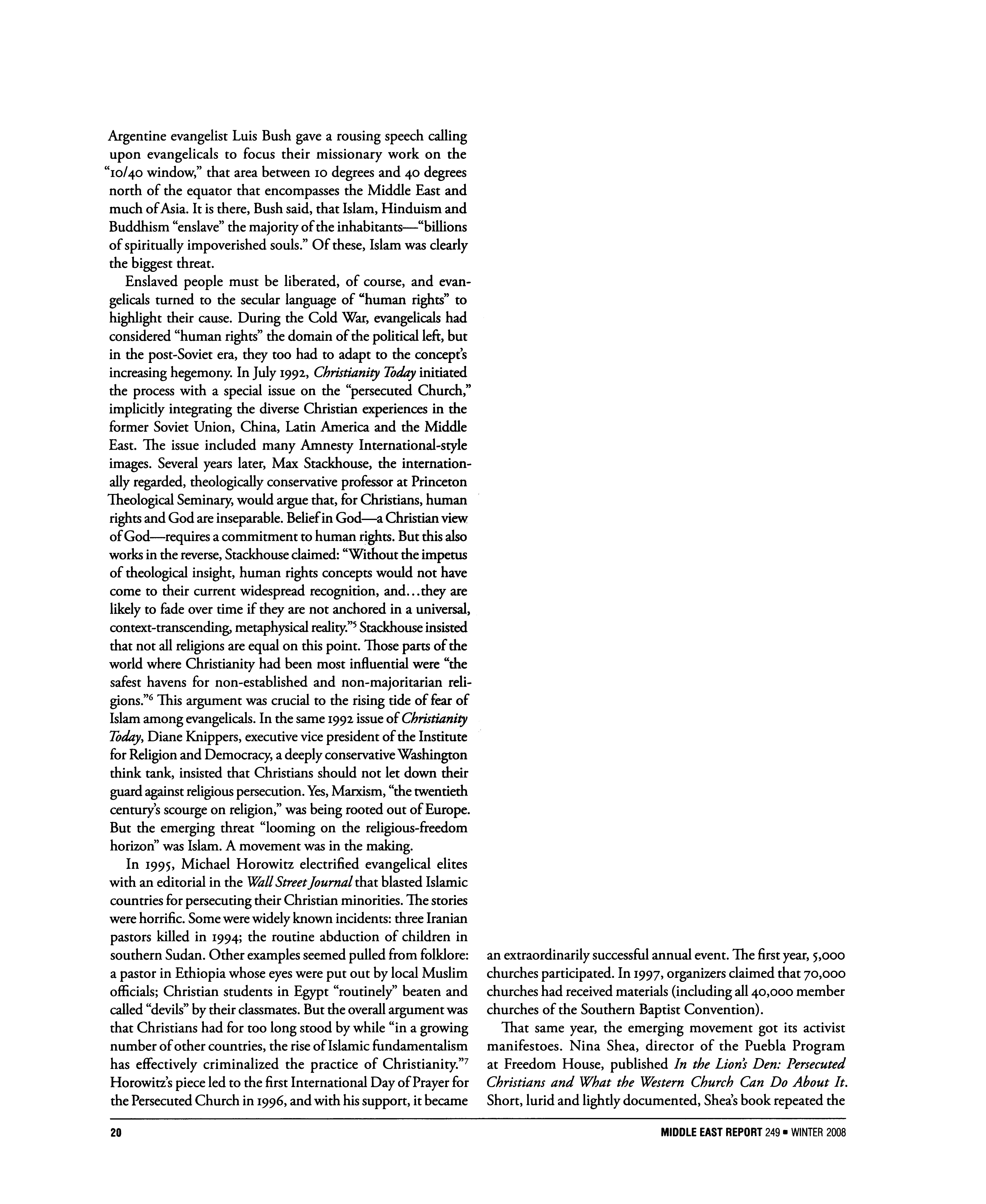
Argentine evangelist Luis Bush gave a rousing speech calling upon evangelicals to focus theirmissionary work on the "10/40window," thatarea between 10degrees and 40 degrees north of the equator that encompasses theMiddle East and much ofAsia. It isthere,Bush said, that Islam,Hinduism and Buddhism "enslave" themajority of the inhabitants?"billions of spiritually impoverished souls."Of these, Islamwas clearly thebiggest threat.
Enslaved people must be liberated, of course, and evan gelicals turned to the secular language of "human rights" to highlight theircause. During theCold War, evangelicals had considered "human rights"thedomain of thepolitical left,but in thepost-Soviet era, they too had to adapt to the concepts increasinghegemony. In July1992,ChristianityToday initiated the process with a special issue on the "persecuted Church," implicidy integratingthediverseChristian experiences in the formerSoviet Union, China, Latin America and theMiddle East. The issue included many Amnesty International-style images. Several years later,Max Stackhouse, the internation ally regarded, theologically conservative professorat Princeton Theological Seminary,would argue that,forChristians, human rightsandGod are inseparable.Belief inGod?a Christian view ofGod?requires a commitment tohuman rights.But thisalso works inthereverse,Stackhouse claimed: "Without the impetus of theological insight,human rightsconcepts would not have come to their current widespread recognition, and...they are likelyto fade over time iftheyare not anchored ina universal, context-transcending,metaphysical reality."5Stackhouse insisted thatnot all religionsare equal on thispoint. Those parts of the world where Christianity had been most influentialwere "the safesthavens for non-established and non-majoritarian reli gions."6This argumentwas crucial to the rising tideof fearof Islam among evangelicals. In thesame 1992 issueofChristianity Today\Diane Knippers, executivevice president of the Institute forReligion andDemocracy, adeeply conservativeWashington think tank, insisted thatChristians should not letdown their guard against religiouspersecution.Yes,Marxism, "the twentieth century'sscourge on religion,"was being rooted out ofEurope. But the emerging threat "looming on the religious-freedom horizon" was Islam. A movement was in themaking.
In 1995,Michael Horowitz electrified evangelical elites with an editorial in theWall StreetJournal thatblasted Islamic countries forpersecuting theirChristian minorities. The stories were horrific.Some werewidely known incidents: threeIranian pastors killed in 1994; the routine abduction of children in southern Sudan. Other examples seemed pulled fromfolklore: a pastor inEthiopia whose eyeswere put out by localMuslim officials;Christian students inEgypt "routinely" beaten and called "devils"by theirclassmates. But theoverall argumentwas thatChristians had for too long stood bywhile "in a growing number ofother countries, theriseof Islamic fundamentalism has effectively criminalized the practice of Christianity."7 Horowitz's piece led to thefirstInternationalDay ofPrayer for thePersecutedChurch in1996,andwith his support, itbecame

an extraordinarilysuccessfulannual event.The firstyear, 5,000 churches participated. In 1997,organizers claimed that70,000 churches had receivedmaterials (including all40,000 member churches of theSouthern Baptist Convention).
That same year, the emerging movement got its activist manifestoes. Nina Shea, director of the Puebla Program at Freedom House, published In theLions Den: Persecuted Christians and What theWestern Church Can Do About It. Short, luridand lightlydocumented, Sheas book repeated the 20MIDDLEEASTREPORT249 WINTER2008
^^^^^^^^H^^^^H^^^^^B^^HaBnH^Bi^^^ nBi^^HSBB^B^B^^^BIii^Hi^^^B^^^ - **%
3lB JhB
wi^BIBMIB '
This content downloaded from 198.91.37.2 on Sun, 18 Aug 2013 19:02:40 PM All use subject to JSTOR Terms and Conditions
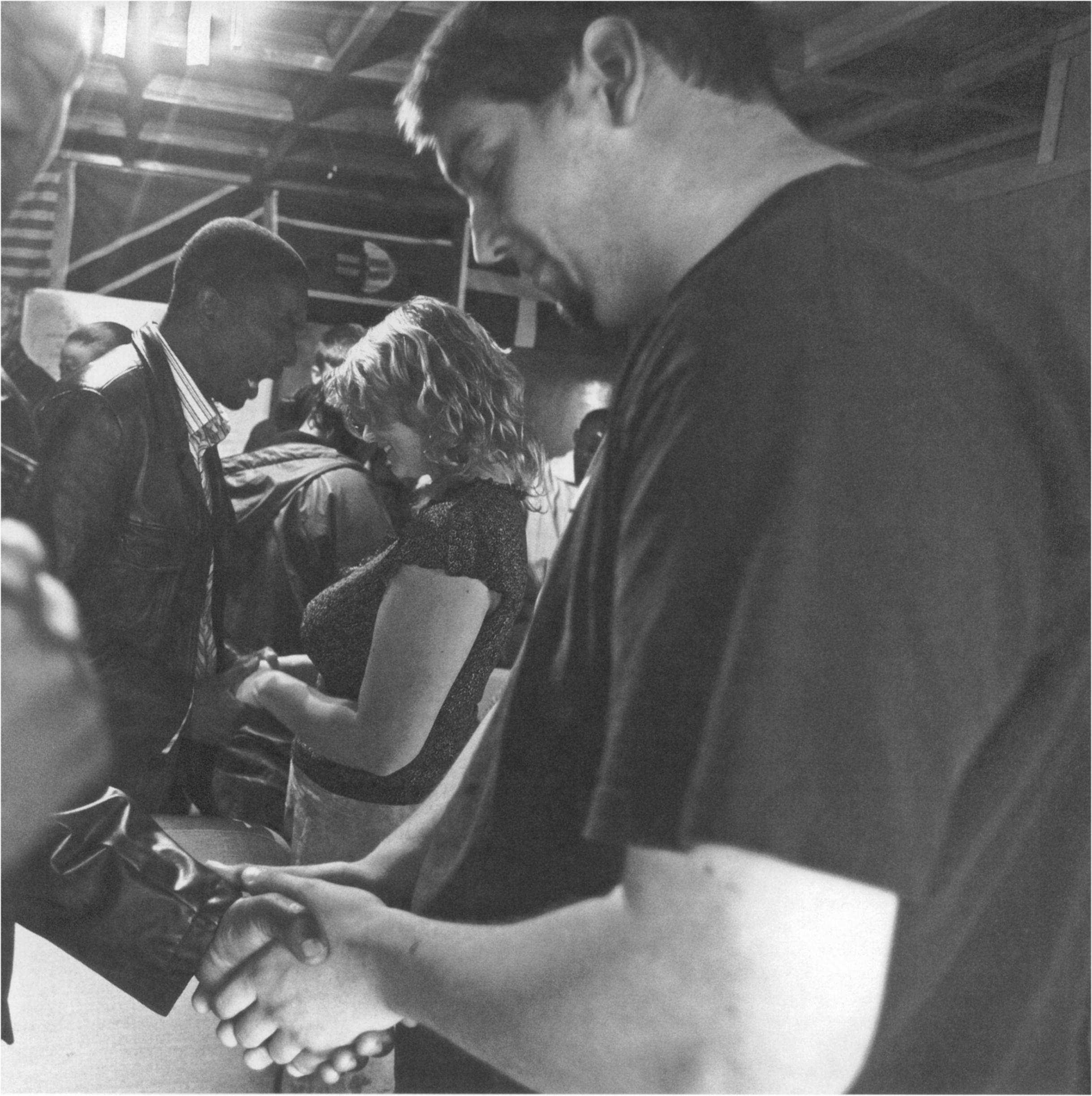
Localevangelicals andforeignmissionaries praytogether inSwaziland. i.uiz maximiano/wpn
standard scriptthattherewere two zones ofglobal concern for Christians: Islamic countries and the still extant communist world. Paul Marshall, also at Freedom House, produced the more detailed and scholarly studywith an equally sensation alist title,TheirBlood Cries Out. These two books became for the anti-persecution movement what Fanon's Wretched of the Earth had been to a ratherdifferentgroup of activists in the 1960s?angry, righteous documents of suffering that were carried around from meeting to meeting.
MIDDLEEASTREPORT249 WINTER2008 21
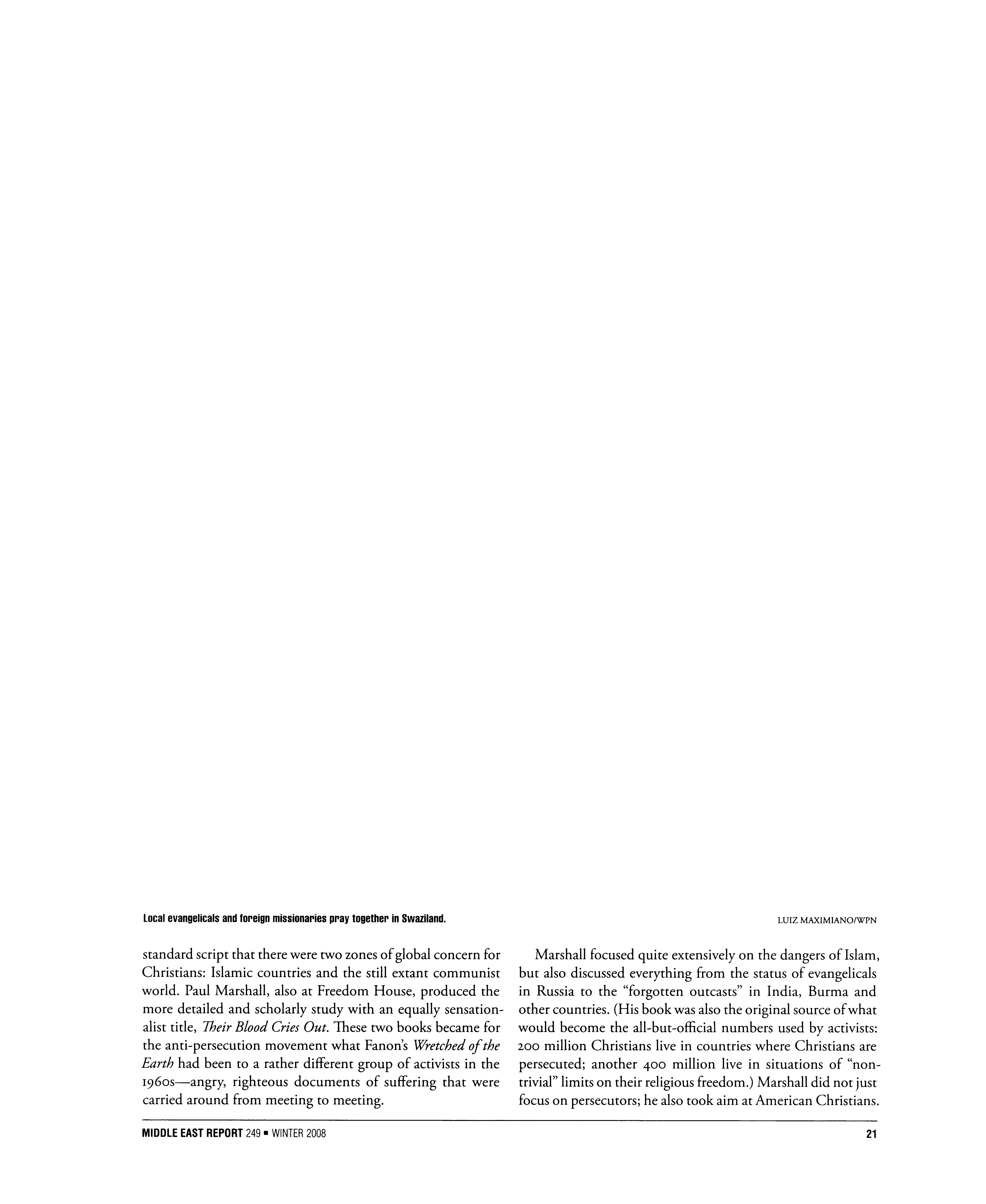
Marshall focused quite extensivelyon thedangers of Islam, but also discussed everything from the status of evangelicals in Russia to the "forgotten outcasts" in India, Burma and other countries. (His book was also theoriginal source ofwhat would become the all-but-official numbers used by activists: 200 million Christians live in countrieswhere Christians are persecuted; another 400 million live in situations of "non trivial"limitson theirreligious freedom.)Marshall did not just focus on persecutors; he also took aim atAmerican Christians.
il^M^&s ^ii__tti_i_^_M_l_^_-__flPi9_9F_^__^__^__^__^__^__^__^__HRfi^BB' fl^^!H__^__^__^__^__^__^__l__^__^__^__^__^__^__^__^__^__^__^__^__^__^__^__^__^_lIllsllliillllii<^1il____^__^__^__^__HHiii_i_H_^_^j_^_^_^_^_^_^_^_^_^_^_^_^_^_v>I__^HPw^* iI_^__^__^__^__^__^__^__^__^__^__^__^__^__^__^__^__^__^__^__^__^__^__^__^__^__^__^__^__h ~'^^8|w3P'"Ay"v'^Hb^^^^^^^^^^^^^HF J^^^^^^^^^^^^^^^^^KL i_^__HF/--''' :^^V'V__l__^__^__^__^__^__^__^__^__^__^__^__^__^__^__^__^__^__^__^__^__^__^__^__i fl_9SHiirjP^M^^HRIHh_H_R_M_1^^^^^^i^^^^^HII^__^__^__^__^__^__^__^__^__^__^__^__^__^_H__^__^__l ___E_1_I__h1I__-___-_-_fliiii_^^__1__________________________________________________________________ ^^5_^Ki_^_^_H_^_HP^^_^_fl_P^^^_H*S_i__^__^__^__^__^__^__^__^__^Bil__^__B^_J_I_^_^_^_^_^_^_^_^_^_^_^_^_^_^_^_^_^_^_^_^_^_^_^_^_^_I PVKv^J__^__I__I__P^^__^__hP^__^_^_^_w^ii^_^_^_^_-____ll^_^_^_^_^_^_^_K^_^_^_B_-_^ * _j_^_^_^_^_^_^_^_^_^_^_^_^_^_^_^_^_^_^_^_^_^_^_^_^_^_^H ,;'m-' ________Pr ^^^^ Sh^B w^
_^_^_I_^_^_^_^_^_^_^_^_^_^_b^v___^__^_^H^E_^_i_ll-_^_HI__^_^HH_^_^-fl_^_-_^_^_Kr _^_^_^_^_^_^_^_^_^_^_^_^_^_^_^_^_^_^_^_^_^_^_^_^_^_^_^_^_^_^_^_^_^_^_^_^_^_^_l Ihk ^^__^__^__^__^__^__^__^__^H__^__^__^__^__^__^H^i_i__^__^__H__^__i__^__V_^__^__^__^__^__^__^__^__^__^__^__^__^__^__^__^__^__^__^__^__^__^__^__^__^__
v__t^__n___^^_^_^_^_^_^_^_^_^_^_^_^_IH_l_^_^_HH__^^...__Ilill-^_^_^_^_Hli_^_^_B ^-^:^.^jaMH^^^^^^B^^^^^^^^^M^^^^^^^^Bp
^^^^^^^^^^^^^^^^^^^^^^^^^^^^^^^^^^^^^^^^^^^H__________________________________ ^^
^^!&^__H_l_^^^_tfM__^_^_^_^_l-_^_^_^_^_^_^_P_Ml_^_^_^_^_^_^_^_Hr_fl__^__^__^__^__^__^__^__^__^__^__^__^__^__^__^__^__^__^__^__^__^__^__^__^__^__^__^__^__^__ -_-_-_-_-_-_B_-_-_-_-_-_-_-_-_-_-_-_-_l_^^ - g___i_i_______________________________________ _^_^_^_^_^_^_^_^_^_^_^_^_^_^_^_M_^_^_l_H_HHl_i_^__^^^^^^^^_^_^_^_^_^_^_^_^_^_^_^_^_^_^_^_^_^_^_^_P^^_K' ^^^^(^_^_^_^_^_^_^_^_^_^_^_^_^_^_^_^_l I ^^^_^_^_^_^_^_^_^_^_hp 3JMe v .^^* ^^H|^HH_^_^it_^^-' '<-:;^i^H^H!P^'J__^__^__^__^__^__^__^__^__^__^__^__H 1^^^__^r^__T_4-L___^^BBHBB8_HH_^iii__^^^^P^ f if_^__^__^__^__^__^__^__^__^__^__^__l MtdKr_i_^__^H__^__i__^____H__H__i^^^'^;J__^__^__^__^__^__^__^__^__^__^__^__^__^__h 1rr _^? * _^^___Mm ^? _^p j_r -j^^^^^^MiP^WiHiwwSWP __^__^__^__^__^__^__^__^__^__^__^__^__^__H <I_?e-<^MVF _u _dMMI__F__P^_^_^_^_^_^_^B_l^^ag^^^^^^ii?^^P!--:-' '^'"' _^____^__^__^__^__^__^__^__^__^__^__^__^__^__^__^__l f ' y9"--->adpT^ '^ri^^__^__^__^__^__M__^^B^^Wlli^^^k'''__^_^_^_^_^_^_^_^_^_^_^_^_^_^_^_^_^_^_^_l jl^jt^^^^P ^.^'fSf^.j_________________________________________________
^HOil^^E^Hn^Hr^^^^^^^^^^^^^^^^^^^^^^^l
j_fl____________________________________________fi^^I^BHB^^^^^^^^^^^^^^^^^^^^^^^^^^^^^^^^^^^^^^^^^^^^^^^^^^^^^^^H 4yil_^_fl__^_^_^_^_^_^_^_^_^_^_K__^^
^^^m
^*MiJHII^^^^^^^^^^^^^^^Bl^_________________________________r
This content downloaded from 198.91.37.2 on Sun, 18 Aug 2013 19:02:40 PM All use subject to JSTOR Terms and Conditions
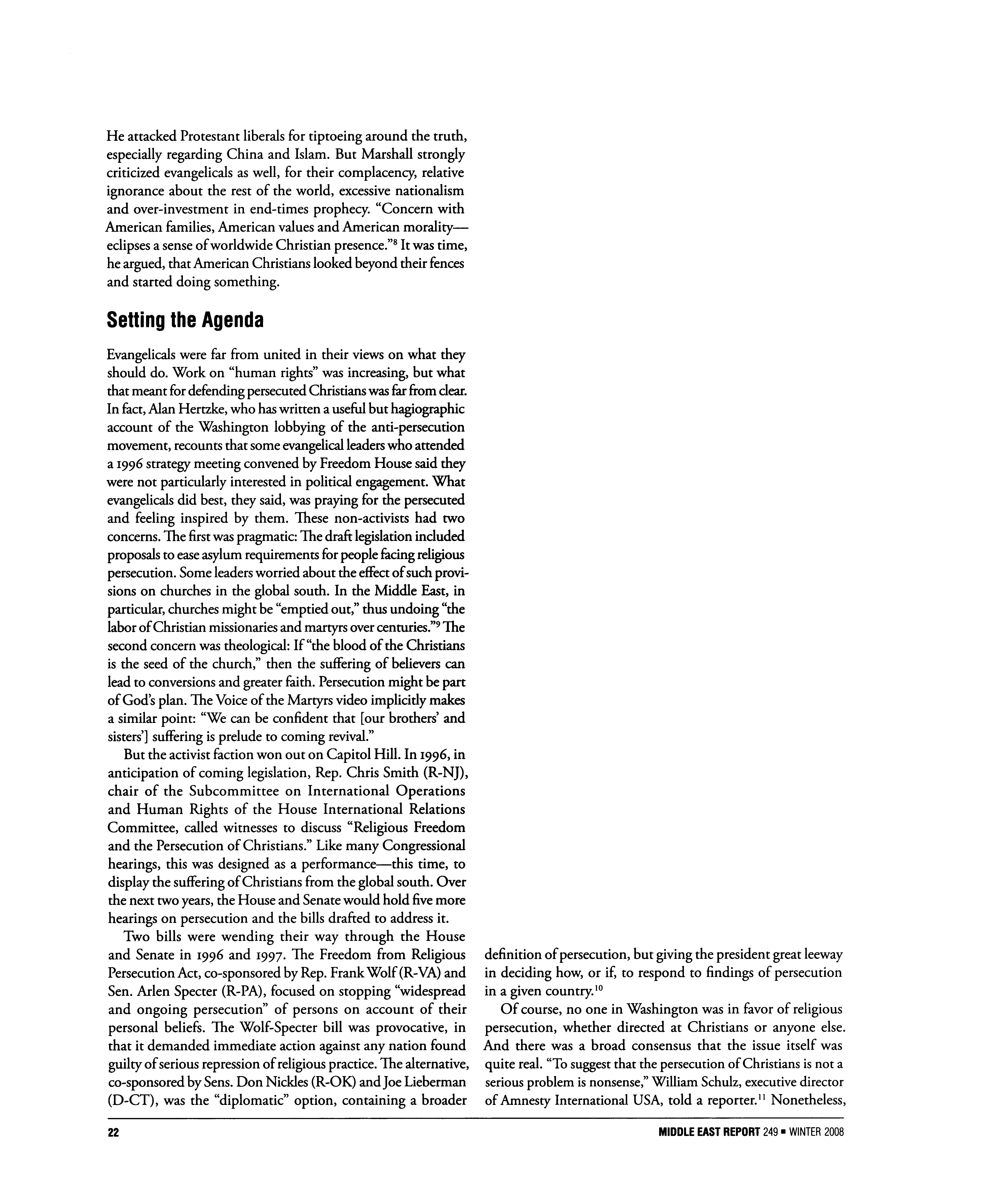
He attacked Protestant liberalsfortiptoeing around the truth, especially regardingChina and Islam. ButMarshall strongly criticized evangelicals aswell, for theircomplacency, relative ignorance about the restof theworld, excessive nationalism and over-investment in end-times prophecy. "Concern with American families,American values andAmerican morality? eclipses a sense ofworldwide Christian presence."8 Itwas time, he argued, thatAmerican Christians looked beyond theirfences and starteddoing something.
SettingtheAgenda
Evangelicals were farfromunited in theirviews on what they should do.Work on "human rights"was increasing,butwhat thatmeant fordefendingpersecutedChristianswas farfromclear. Infact,Alan Hertzke, who haswritten ausefulbuthagiographic account of theWashington lobbying of the anti-persecution movement, recounts that some evangelical leaders who attended a 1996 strategymeeting convened byFreedom House said they were not particularly interestedinpolitical engagement.What evangelicals did best, theysaid,was praying forthepersecuted and feeling inspired by them. These non-activists had two concerns.The firstwas pragmatic:The draftlegislation included proposals toease asylum requirementsforpeople facingreligious persecution. Some leadersworried about theeffectof suchprovi sions on churches in theglobal south. In theMiddle East, in particular,churchesmight be "emptied out," thusundoing "the laborofChristianmissionaries andmartyrsovercenturies."9The second concernwas theological: If"theblood of theChristians is the seed of the church," then the sufferingof believers can lead toconversions and greaterfaith.Persecutionmight be part ofGods plan. The Voice of theMartyrs video implicidymakes a similarpoint: "We can be confident that [ourbrothers' and sisters']sufferingisprelude tocoming revival."
But theactivistfactionwon out onCapitol Hill. In 1996, in anticipation of coming legislation,Rep. Chris Smith (R-NJ), chair of the Subcommittee on International Operations and Human Rights of theHouse International Relations Committee, called witnesses to discuss "Religious Freedom and thePersecution ofChristians." Like many Congressional hearings, thiswas designed as a performance?this time, to display thesufferingofChristians from theglobal south.Over thenext two years, theHouse and Senatewould hold fivemore hearings on persecution and thebills drafted to address it.
Two bills were wending theirway through theHouse and Senate in 1996 and 1997. The Freedom fromReligious PersecutionAct, co-sponsored byRep. FrankWolf (R-VA) and Sen. Arien Specter (R-PA), focused on stopping "widespread and ongoing persecution" of persons on account of their personal beliefs. TheWolf-Specter bill was provocative, in that itdemanded immediate action against any nation found guiltyof serious repressionof religiouspractice.The alternative, co-sponsored bySens.Don Nickles (R-OK) and JoeLieberman (D-CT), was the "diplomatic" option, containing a broader
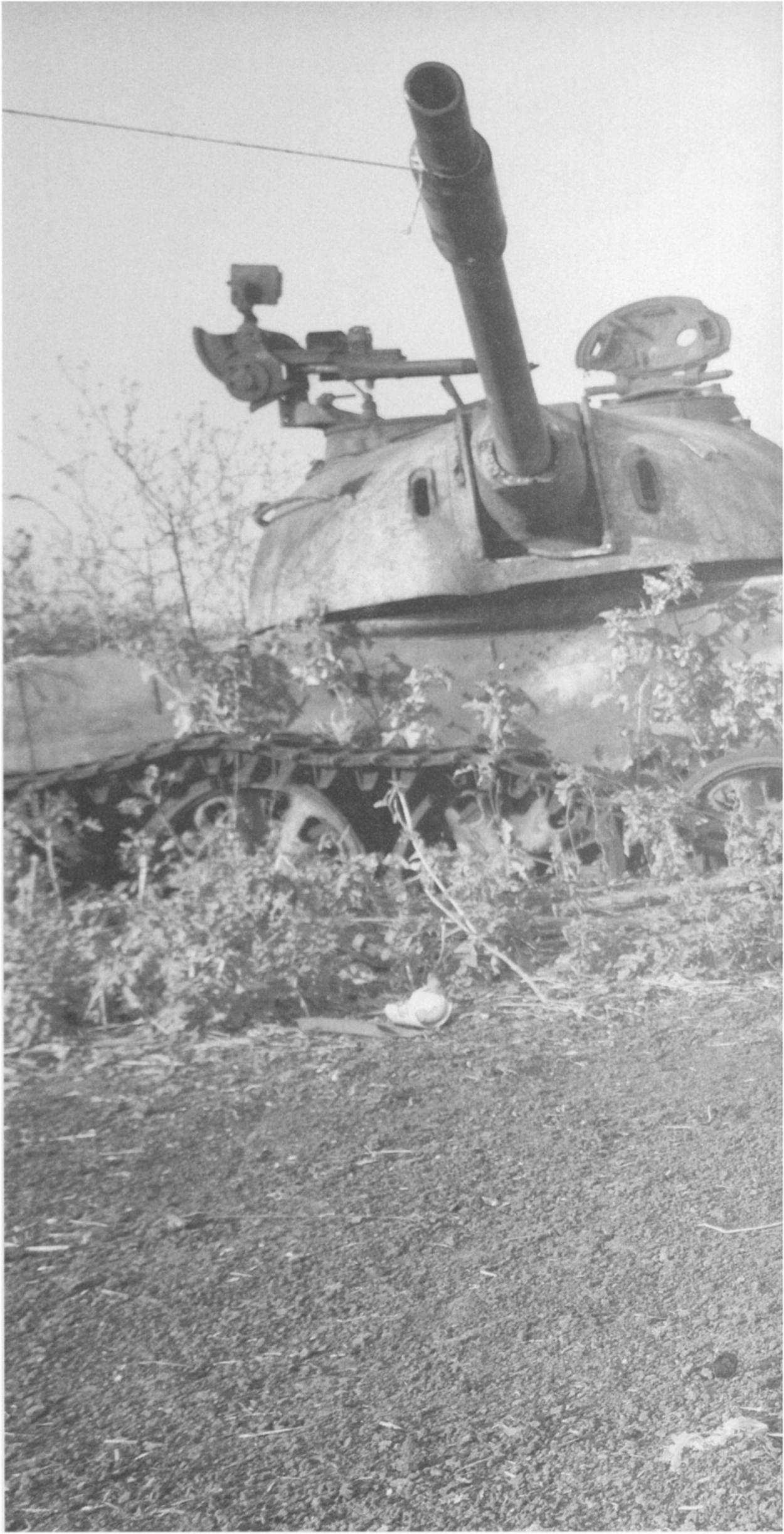
definition ofpersecution, but giving thepresident great leeway indeciding how, or if,to respond tofindings of persecution in a given country.10
Of course, no one inWashington was infavorof religious persecution, whether directed at Christians or anyone else. And therewas a broad consensus that the issue itselfwas quite real. "To suggest that the persecution ofChristians isnot a serious problem isnonsense," William Schulz, executive director ofAmnesty InternationalUSA, told a reporter.11Nonetheless, 22MIDDLEEASTREPORT249 WINTER2008
8f:iJBBPPIHB6^illSS^^ js&^f^ifeij!
This content downloaded from 198.91.37.2 on Sun, 18 Aug 2013 19:02:40 PM All use subject to JSTOR Terms and Conditions
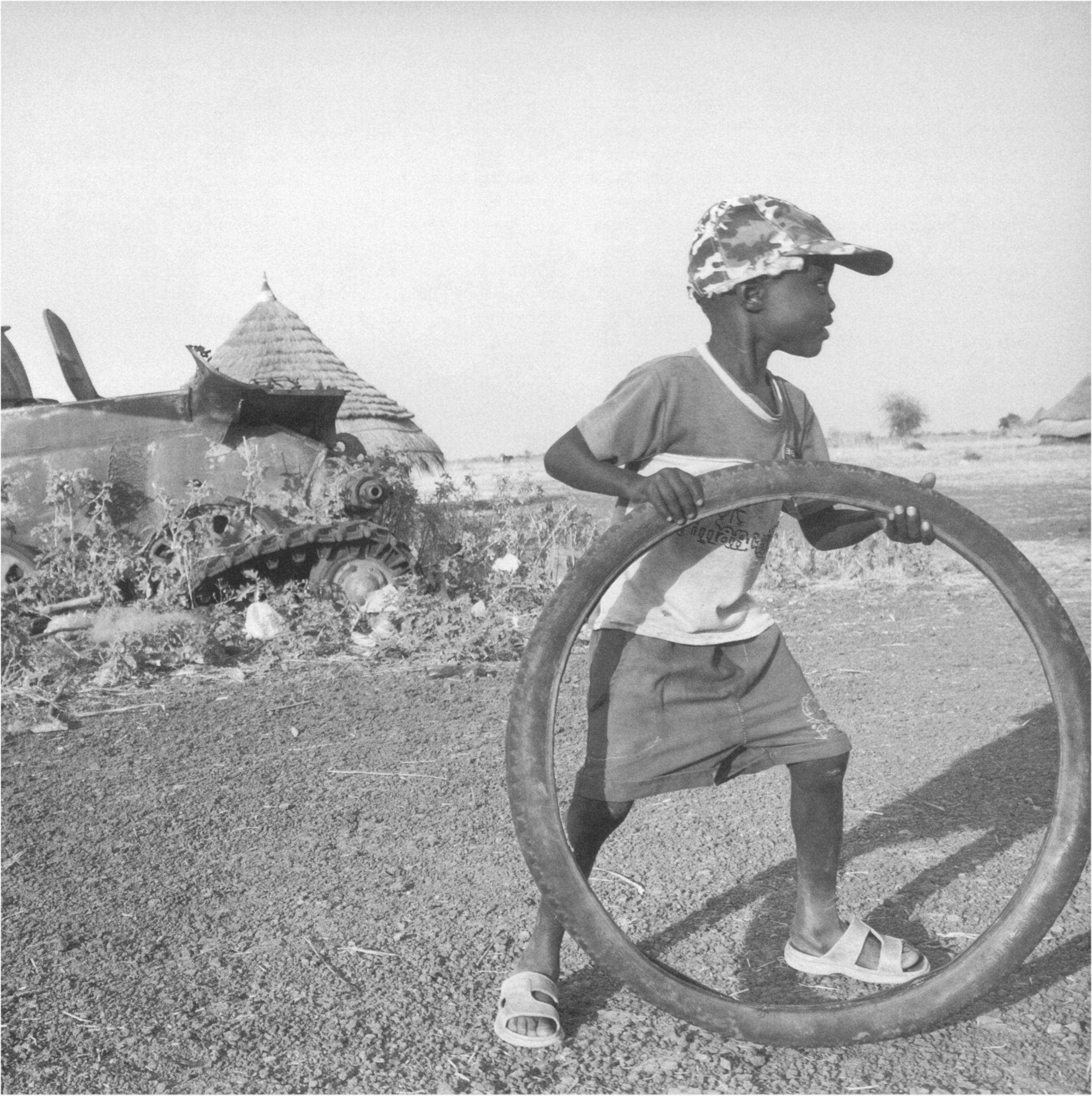
Nasir,UpperNileState, southernSudan. sventorfinn/panos pictures
traditional human rightsgroups likeAmnesty and Human RightsWatch, as well as some liberalmainline Protestant denominations, were concerned about "a questionable selectivityof participants" at thehearings.12Almost all of the witnesses, indeed, represented conservative Christian organiza tions. Liberals worried that the anti-persecution movement was uninterested in the largerhuman rightsagenda, that in fact itonly cared about Christians. They furtherthought that the Wolf-Specter bill, inparticular,was too blunt an instrument,
MIDDLEEASTREPORT249 WINTER2008 23
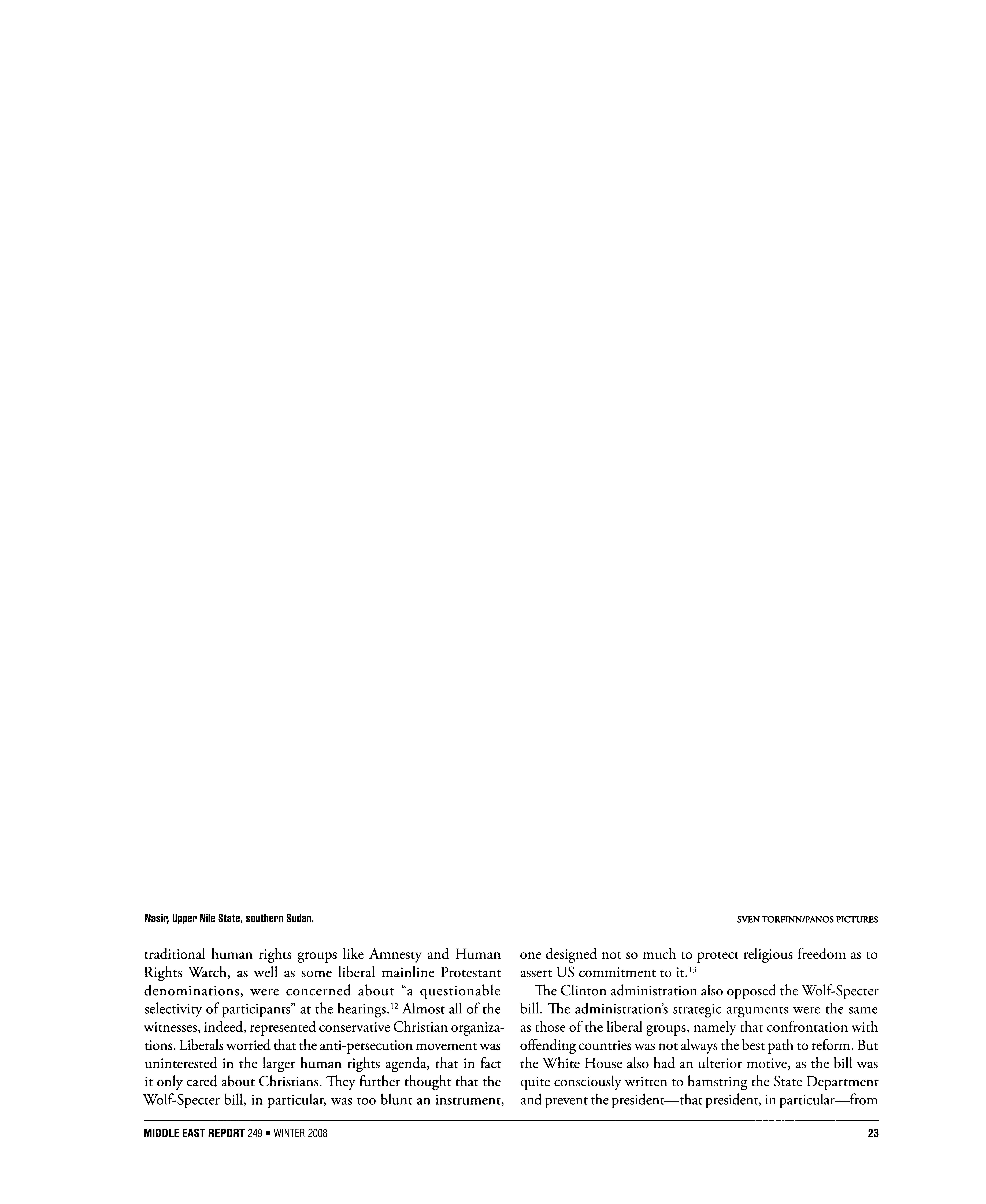
one designed not somuch toprotect religious freedom as to assert US commitment to it.13
The Clinton administration also opposed theWolf-Specter bill. The administration's strategic arguments were the same as thoseof the liberalgroups, namely thatconfrontationwith offending countries was not always the best path to reform. But theWhite House also had an ulteriormotive, as thebillwas quite consciously written to hamstring the State Department and prevent the president?that president, inparticular?from
This content downloaded from 198.91.37.2 on Sun, 18 Aug 2013 19:02:40 PM All use subject to JSTOR Terms and Conditions
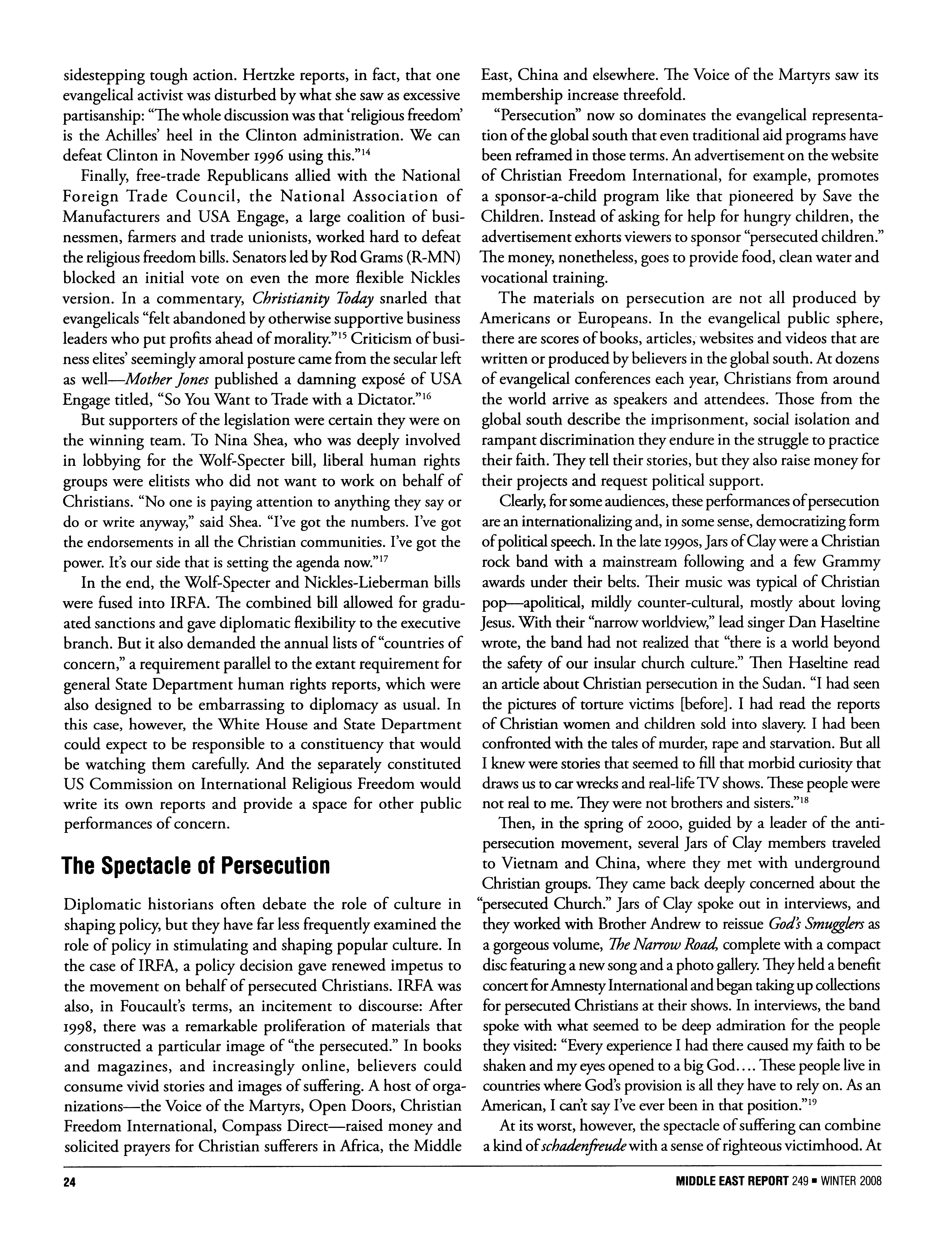
sidestepping tough action. Hertzke reports, in fact, thatone evangelical activistwas disturbed bywhat she saw as excessive partisanship: "Thewhole discussionwas that 'religiousfreedom' is theAchilles' heel in theClinton administration.We can defeatClinton inNovember 1996 using this."14
Finally, free-tradeRepublicans allied with theNational Foreign Trade Council, the National Association of Manufacturers and USA Engage, a large coalition of busi nessmen, farmersand tradeunionists, worked hard todefeat thereligiousfreedombills. Senators ledbyRod Grams (R-MN) blocked an initial vote on even themore flexible Nickles version. In a commentary, Christianity Today snarled that evangelicals "feltabandoned by otherwise supportive business leaderswho put profitsahead ofmorality."15Criticism ofbusi ness elites' seeminglyamoral posture came fromthesecular left aswell?Mother Jones published a damning expose ofUSA Engage titled, "So YouWant toTrade with aDictator."16
But supporters of the legislationwere certain theywere on thewinning team.To Nina Shea, who was deeply involved in lobbying for theWolf-Specter bill, liberal human rights groups were elitistswho did not want towork on behalf of Christians. "No one ispaying attention to anything they say or do or write anyway," said Shea. "I've got the numbers. I've got the endorsements in all theChristian communities. I've got the power. It's our side that is setting the agenda now."17
In the end, theWolf-Specter andNickles-Lieberman bills were fused into IRFA. The combined bill allowed forgradu ated sanctions and gave diplomatic flexibilityto the executive branch. But italso demanded theannual listsof "countries of concern," a requirement parallel to the extant requirement for general StateDepartment human rightsreports,which were also designed to be embarrassing to diplomacy as usual. In this case, however, theWhite House and State Department could expect to be responsible to a constituency thatwould be watching them carefully.And the separately constituted US Commission on International Religious Freedom would write its own reports and provide a space for other public performances of concern.
TheSpectacleofPersecution
Diplomatic historians often debate the role of culture in shaping policy, but theyhave farlessfrequentlyexamined the role of policy in stimulating and shaping popular culture. In the case of IRFA, a policy decision gave renewed impetus to themovement on behalf of persecuted Christians. IRFA was also, in Foucault's terms, an incitement to discourse: After 1998, there was a remarkable proliferation of materials that constructed a particular image of "thepersecuted." In books and magazines, and increasingly online, believers could consume vivid storiesand images of suffering.A host of orga nizations?the Voice of theMartyrs, Open Doors, Christian Freedom International, Compass Direct?raised money and solicited prayers forChristian sufferersinAfrica, theMiddle
East, China and elsewhere. The Voice of theMartyrs saw its membership increase threefold.
"Persecution" now so dominates the evangelical representa tionof theglobal south thateven traditionalaid programs have been reframed in those terms. An advertisement on thewebsite ofChristian Freedom International, for example, promotes a sponsor-a-child program like that pioneered by Save the Children. Instead of asking forhelp forhungry children, the advertisement exhorts viewers to sponsor "persecuted children." The money, nonetheless, goes to provide food, clean water and vocational training.
The materials on persecution are not all produced by Americans or Europeans. In the evangelical public sphere, there are scores of books, articles, websites and videos that are written orproduced bybelievers intheglobal south.At dozens of evangelical conferences each year,Christians from around theworld arrive as speakers and attendees. Those from the global south describe the imprisonment, social isolation and rampantdiscrimination theyendure inthe struggletopractice theirfaith.They tell theirstories,but theyalso raisemoney for theirprojects and request political support.
Clearly, for some audiences, these performances ofpersecution are an internationalizing and, in some sense, democratizing form ofpolitical speech. In thelate1990s,JarsofClay were aChristian rock band with amainstream following and a fewGrammy awards under theirbelts. Theirmusic was typicalofChristian pop?apolitical, mildly counter-cultural,mostly about loving Jesus.With their"narrowworldview," lead singerDan Haseltine wrote, theband had not realized that "there isaworld beyond the safetyof our insularchurch culture."Then Haseltine read an articleaboutChristian persecution in theSudan. "I had seen thepictures of torturevictims [before]. I had read the reports ofChristian women and children sold into slavery.I had been confronted with the tales ofmurder, rape and starvation. But all Iknewwere storiesthatseemed tofillthatmorbid curiositythat draws us to carwrecks and real-life TV shows. These people were not real tome. They were not brothers and sisters."18
Then, in the springof 2000, guided by a leaderof theanti persecution movement, several Jars of Clay members traveled toVietnam and China, where theymet with underground Christian groups. They came back deeply concerned about the "persecutedChurch." JarsofClay spoke out in interviews,and theyworked with BrotherAndrew to reissueGods Smugglersas a gorgeous volume, TheNarrow Road completewith a compact disc featuringanew songand aphoto gallery.They held a benefit concertforAmnesty Internationalandbegan takingup collections forpersecutedChristians at theirshows. In interviews,theband spokewith what seemed tobe deep admiration for thepeople theyvisited: "Everyexperience Ihad therecausedmy faithtobe shakenandmy eyesopened toa bigGod.... These people livein countrieswhere God sprovision isall theyhave to relyon.As an American, I can't say I've ever been in that position."19
At itsworst, however, the spectacle of suffering can combine akind of schadenfreudewith a senseof righteousvictimhood. At 24MIDDLEEASTREPORT249 WINTER2008
This content downloaded from 198.91.37.2 on Sun, 18 Aug 2013 19:02:40 PM All use subject to JSTOR Terms and Conditions
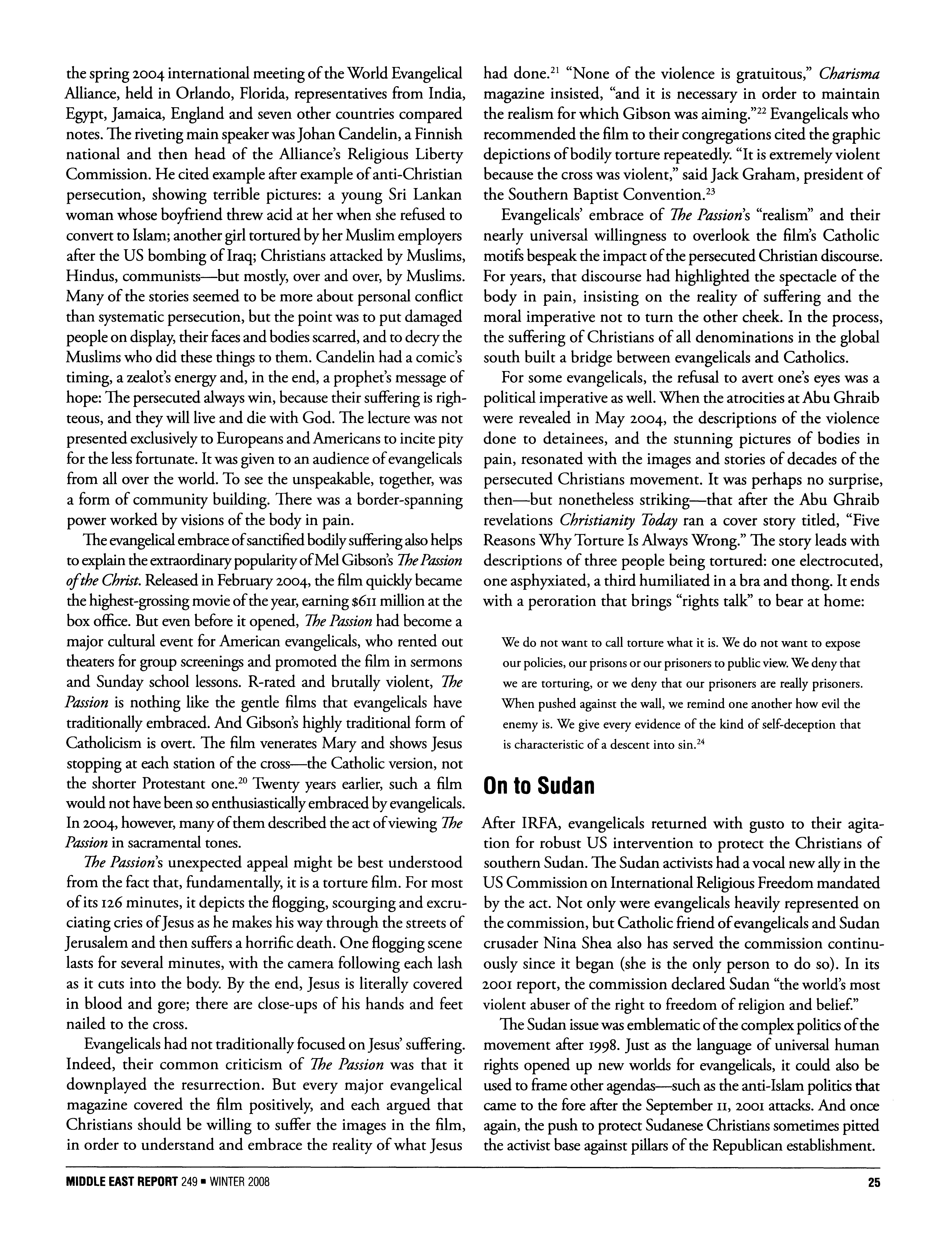
thespring2004 internationalmeeting of theWorld Evangelical Alliance, held inOrlando, Florida, representativesfrom India, Egypt, Jamaica,England and seven other countries compared notes. The rivetingmain speakerwas JohanCandelin, a Finnish national and then head of theAlliance's Religious Liberty Commission. He cited example afterexample of anti-Christian persecution, showing terriblepictures: a young Sri Lankan woman whose boyfriend threwacid atherwhen she refusedto convertto Islam; anothergirltorturedbyherMuslim employers aftertheUS bombing of Iraq;Christians attacked byMuslims, Hindus, communists?but mostly, over and over, byMuslims. Many of the storiesseemed tobemore about personal conflict than systematic persecution, but the point was to put damaged people on display,theirfacesand bodies scarred,and todecry the Muslims who did thesethingsto them.Candelin had a comic's timing, a zealot's energy and, in the end, a prophet's message of hope: The persecuted alwayswin, because theirsufferingisrigh teous,and theywill liveand diewith God. The lecturewas not presented exclusivelytoEuropeans andAmericans to incitepity for the less fortunate. Itwas given to an audience of evangelicals from all over theworld. To see the unspeakable, together, was a formof community building. There was a border-spanning powerworked byvisions of thebody inpain.
The evangelicalembraceof sanctifiedbodily sufferingalsohelps toexplain theextraordinarypopularityofMel Gibson's ThePassion oftheChrist.Released inFebruary2004, thefilmquickly became thehighest-grossingmovie of theyear,earning$611million at the box office.But evenbefore itopened, ThePassion had become a major cultural eventforAmerican evangelicals,who rentedout theatersforgroup screeningsand promoted thefilm insermons and Sunday school lessons.R-rated and brutallyviolent, The Passion isnothing like the gentle films that evangelicals have traditionallyembraced.And Gibson's highly traditionalformof Catholicism isovert.The filmveneratesMary and shows Jesus stopping at each station of the cross?the Catholic version, not the shorter Protestant one.20 Twenty years earlier, such a film would nothave been soenthusiasticallyembraced byevangelicals. In2004, however,many of themdescribed theactofviewingThe Passion in sacramental tones.
ThePassions unexpected appeal might be best understood from thefactthat,fundamentally, itisa torturefilm.Formost of its126minutes, itdepicts theflogging, scourging and excru ciating criesofJesusashemakes hisway through thestreetsof Jerusalemand thensuffersahorrificdeath.One flogging scene lastsfor severalminutes, with thecamera following each lash as itcuts into thebody. By the end, Jesus is literallycovered inblood and gore; there are close-ups of his hands and feet nailed to the cross.
Evangelicals had not traditionallyfocused on Jesus'suffering. Indeed, their common criticism of The Passion was that it downplayed the resurrection. But everymajor evangelical magazine covered the film positively, and each argued that Christians should be willing to sufferthe images in thefilm, inorder tounderstand and embrace the realityofwhat Jesus
had done.21 "None of the violence isgratuitous," Charisma magazine insisted, "and it is necessary in order tomaintain the realismforwhich Gibson was aiming."22Evangelicals who recommended thefilm to theircongregations cited thegraphic depictions ofbodily torturerepeatedly. "It isextremelyviolent because thecrosswas violent," said JackGraham, president of theSouthern Baptist Convention.23
Evangelicals' embrace of ThePassions "realism" and their nearly universal willingness to overlook the film'sCatholic motifs bespeak the impactof thepersecutedChristian discourse. For years, thatdiscourse had highlighted the spectacle of the body in pain, insisting on the reality of sufferingand the moral imperative not to turn the other cheek. In the process, the sufferingofChristians of all denominations in theglobal south built a bridge between evangelicals and Catholics.
For some evangelicals, the refusal to avert one's eyes was a political imperativeaswell.When theatrocitiesatAbu Ghraib were revealed inMay 2004, thedescriptions of theviolence done to detainees, and the stunning pictures of bodies in pain, resonatedwith the images and storiesof decades of the persecuted Christians movement. Itwas perhaps no surprise, then?but nonetheless striking?that after theAbu Ghraib revelations Christianity Today ran a cover story titled, "Five Reasons Why Torture IsAlwaysWrong." The storyleadswith descriptions of threepeople being tortured:one electrocuted, one asphyxiated, a thirdhumiliated ina bra and thong. Itends with a peroration thatbrings "rightstalk" tobear athome:
We do notwant tocall torturewhat itis.We do notwant to expose our policies, ourprisons orour prisoners topublic view.We deny that we are torturing, orwe deny thatour prisoners are reallyprisoners. When pushed against thewall, we remind one another how evil the enemy is.We give every evidence of thekind of self-deception that ischaracteristic ofadescent into sin.24
OntoSudan
After IRFA, evangelicals returnedwith gusto to their agita tion for robustUS intervention to protect theChristians of southernSudan. The Sudan activistshad avocal new ally inthe US Commission on InternationalReligious Freedommandated by the act.Not onlywere evangelicals heavily representedon thecommission, butCatholic friendof evangelicals and Sudan crusaderNina Shea also has served the commission continu ously since itbegan (she is the only person todo so). In its 2001 report, the commission declared Sudan "theworld's most violent abuser of therighttofreedomof religionand belief."
The Sudan issuewas emblematic of thecomplex politicsof the movement after1998. Justas the language of universalhuman rightsopened up new worlds forevangelicals, itcould also be used toframeotheragendas?such as theanti-Islampolitics that came to the fore after the September 11,2001 attacks. And once again, thepush toprotectSudanese Christians sometimespitted theactivistbase againstpillarsof theRepublican establishment.
MIDDLEEASTREPORT249 WINTER2008 25 This content downloaded from 198.91.37.2 on Sun, 18 Aug 2013 19:02:40 PM All use subject to JSTOR Terms and Conditions

Civilwar hadwracked Sudan sincethemid-1980s, asa seriesof more or lessIslamistgovernments triedtoextend theirauthority over the south, an area rich in resources, particularly oil.With varyingdegreesof single-mindedness,Khartoum also attempted to impose Islamic lawon a population thatwas almost entirely made up of Christians, practitioners of traditionalAfrican religions and people mixing elements of both belief systems. In some regions,particularlyBahr al-Ghazal, Arabic-speaking tribesdestroyed villages and abducted women and children intoforced labor?slavery?in thenorth. Starting in the 1980s, the Southern Peoples Liberation Army became the de facto government overmuch of southern Sudan, although various factions also engaged indeadly infighting.The people of the southpaid dearly,with estimatesof thedead fromwar, famine and disease as high as twomillion. By the late 1990s, the south was only one frontinthe rebellionofperipheral regionsagainst thedomineering policies ofKhartoum (apattern intowhich the conflict inMuslim Darfur, startingin2003, also fit).
But many evangelical groups, and others, engaged the complex Sudanese civilwar in a simplisticway. Their task, as they saw it,was to raise awareness that "Arab Muslims" in thenorthwere oppressing "black Christians" in the south? murdering themen and taking thewomen and children as slaves.Evangelical media, andmore so, evangelical fundraising, embraced a vision of theSudan conflictas a religiouswar?or, sometimes, a religious-racial war. That view involved not only a misreading of the identities of the antagonists, but also a simplification of themultiple concrete political issues at stake.Many people in the southwere not Christian, and their"blackness"was generally defined by language or region, not by "race" in anyWestern sense. The southern rebels often disagreed aboutwhether theywanted independence or simply more participation in the national government. They were certainlydetermined toget a greater shareof theprofitsfrom oil, aswell as a degree of autonomy from Islamic law; both provisions were ultimately built into the peace agreement signed in2005.
In theUS and Europe, however,many activistsenthusiasti cally advanced thenotion thatSudan was a combat zone in a grand "clash of civilizations" that, in thewords of prominent spokeswoman Baroness Caroline Cox, arrayed "jihadwarriors" againstChristian believers.25Indeed, thisvision ofepochal battle made forfine localdrama.Activists inPresidentGeorgeW Bush's boyhood home ofMidland, Texas (not coincidentalfy,thebase forthe InternationalDay ofPrayerforthePersecutedChurch in 2001 and 2002) organized a series of concerts and reenactments. Sudanese exileshad built amodel Sudanese village as part of a vigil; later,the exiles andTexans staged amock raid, inwhich parts of thevillagewere burned down and some "fled" into the surrounding desert.26
The conflict inSudan became, forsomewhite evangelicals,a callingcardfora certainracialliberalism.FranklinGraham, sonof BillyGraham and a prayer leaderatboth ofBush's inaugurations, made Sudan a signatureissue.Writing intheWall StreetJournaTm
2000, he suggestedthatreligiousand racialprejudice explained the West's failure to intervene where a "Muslim government iswaging a brutalwar againstChristians." "Justas theWest responded on behalfof theMuslims in [theformer]Yugoslavia," Graham wrote, "it isvitally importantthatChristians inSudan be granted basic human and religiousrights."But perhapsChristianswere being ignored."Or are the livesofEuropeans more valuable than those ofAfricans?"27Subsequent totheSeptembern attacks,theSudan campaigners ratchetedup theirrhetoric.PaulMarshall has consis tendytiedpersecution ofChristians inSudan to thatinVietnam and laterto theanti-Christian "ethniccleansing" perpetratedby insurgentsin Iraq. Sudan and Iraq,Marshall wrote in2004, are fronts in a larger war against "Islamofascism."28
The religious-racialframingof theSudan conflictmobilized African-American Christians aswell. African-American leaders like talk show host JoeMadison and Boston minister Gloria White-Hammond traveledto southernSudan, usuallywith the Switzerland-basedChristian Solidarity International,toperform dramatic "slave redemptions." Even when some of these activists offeredcaveats, theirreportsback home helped toframethepoli ticsofSudan intermsthatresonatedprofoundlywith thehistory of slavery in theUnited States.29This loose coalition ofwhite evangelical and black congregations, togetherwith synagogues, would latertakeup thecause ofDarfur ina campaign that,initially, was suffusedwith thesame religious-racialframing.
As with IRFA in the late 1990s, the BushWhite House aligned itselfagainst the Sudan activists,who had banded together behind the Sudan Peace Act, ameasure that called upon theUS to press Khartoum to come to an agreement with the southern rebels. After September 11, the Bush administration tried to suspend Congressional discussion of theSudan Peace Act, inorder to enlistKhartoum in thewar on terror.As with IRFA, the evangelicals' allies inCongress wanted the toughest possible bill. Rep. Spencer Bachus (R-AL) proposed an amendment prohibiting oil companies thatdid business inSudan fromUS stock exchanges. "When you have tomake a choice between dollars and lives,"Bachus said, "you choose lives."30 In the end, the Bush administra tion quashed theBachus amendment, but could not resist themomentum of the evangelicals, who afterall composed a vital portion of theRepublican Party's political base. Due to IRFA, President Bush already faced the annual embar rassment ofhaving towaive sanctions on Saudi Arabia. The Sudan Peace Act passed in 2002, and, as ithappened, the resultingUS pressure on Khartoum helped to bring about thepeace accords with the southern rebels,finalized in2005, which, though fragile, have greatly reduced attacks against civilians in the south.
WhereAretheLiberals?
In the 1980s,American evangelicals awakened to the global Christian community of which theywere a part. They embraced international human rights?a general commitment 26MIDDLEEASTREPORT249 WINTER2008
This content downloaded from 198.91.37.2 on Sun, 18 Aug 2013 19:02:40 PM All use subject to JSTOR Terms and Conditions
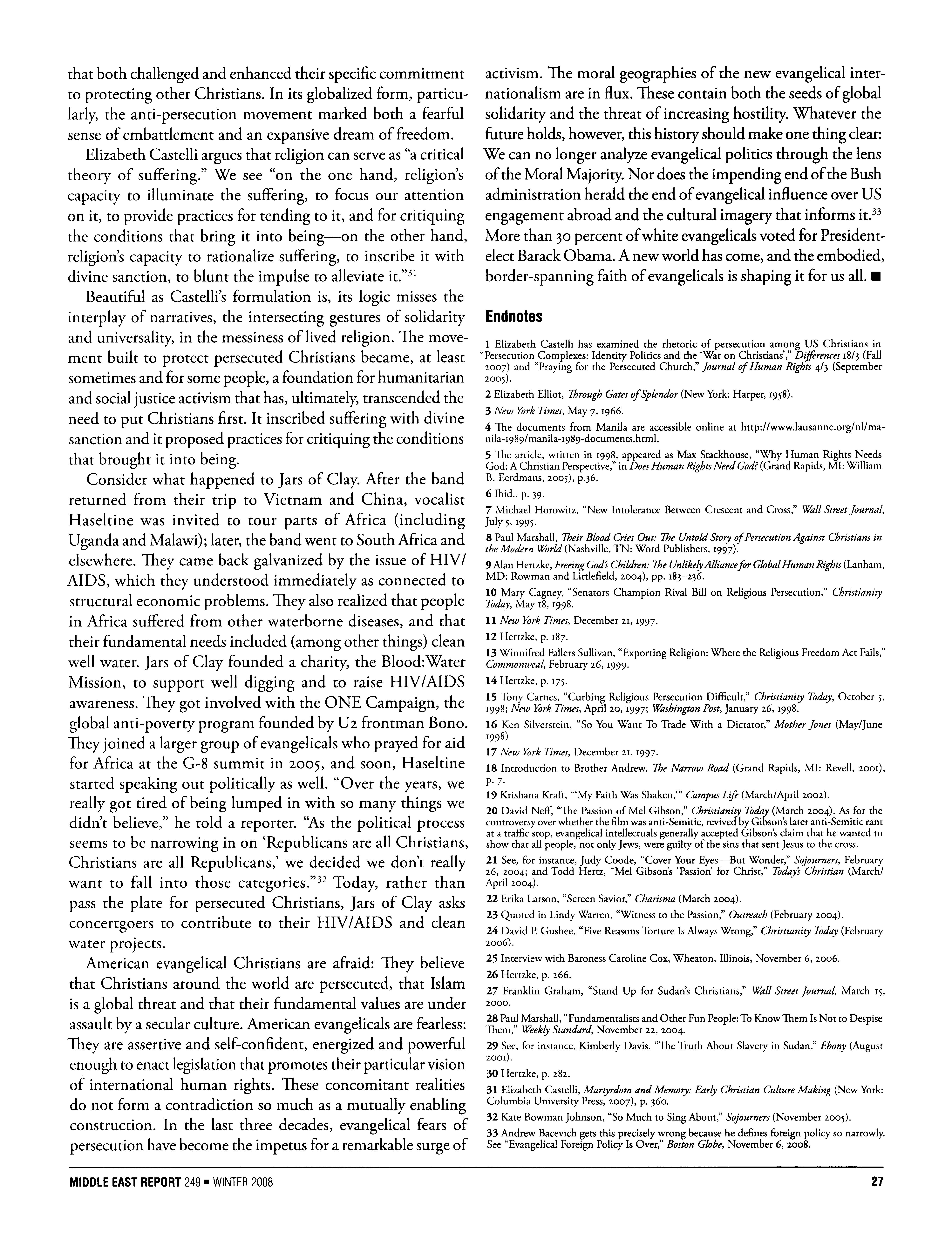
thatboth challenged and enhanced theirspecificcommitment toprotecting otherChristians. In itsglobalized form,particu larly,the anti-persecution movement marked both a fearful sense of embattlement and an expansive dream of freedom.
Elizabeth Castelli argues that religion can serve as "a critical theory of suffering." We see "on the one hand, religion's capacity to illuminate the suffering, to focus our attention on it,toprovide practices for tending to it,and forcritiquing the conditions that bring it into being?on the other hand, religion's capacity to rationalize suffering, to inscribe itwith divine sanction, to blunt the impulse to alleviate it."31
Beautiful as Castelli's formulation is, its logicmisses the interplayof narratives, the intersectinggestures of solidarity and universality, in themessiness of lived religion.The move ment built to protect persecuted Christians became, at least sometimes and forsomepeople, a foundation forhumanitarian and social justiceactivism thathas, ultimately, transcended the need toput Christians first.It inscribed sufferingwith divine sanction and itproposed practices forcritiquing theconditions thatbrought it intobeing.
Consider what happened to JarsofClay. After the band returned from their trip toVietnam and China, vocalist Haseltine was invited to tour parts of Africa (including Uganda andMalawi); later,thebandwent toSouthAfrica and elsewhere. They came back galvanized by the issue ofHIV/ AIDS, which theyunderstood immediately as connected to structuraleconomic problems. They also realized thatpeople inAfrica sufferedfrom otherwaterborne diseases, and that theirfundamental needs included (among other things) clean well water. JarsofClay founded a charity, theBlood:Water Mission, to support well digging and to raiseHIV/AIDS awareness. They got involvedwith theONE Campaign, the global anti-poverty program founded byU2 frontmanBono. They joined a largergroup of evangelicals who prayed foraid forAfrica at theG-8 summit in 2005, and soon, Haseltine started speaking out politically as well. "Over the years, we reallygot tiredof being lumped inwith somany thingswe didn't believe," he told a reporter. "As the political process seems to be narrowing in on 'Republicans are all Christians, Christians are all Republicans,' we decided we don't really want to fall into those categories."32 Today, rather than pass the plate for persecuted Christians, Jarsof Clay asks concertgoers to contribute to theirHIV/AIDS and clean water projects.
American evangelical Christians are afraid: They believe thatChristians around theworld are persecuted, that Islam isa global threatand that theirfundamental values are under assault by a secular culture. American evangelicals are fearless: They are assertive and self-confident,energized and powerful enough toenact legislationthatpromotes theirparticularvision of international human rights.These concomitant realities do not form a contradiction somuch as amutually enabling construction. In the last three decades, evangelical fears of persecution have become the impetus for a remarkable surge of
activism. The moral geographies of thenew evangelical inter nationalism are influx.These contain both the seeds ofglobal solidarityand the threatof increasinghostility.Whatever the futureholds, however, thishistory shouldmake one thingclear: We can no longeranalyze evangelical politics through the lens of theMoral Majority. Nor does the impending end of theBush administration herald theend of evangelical influenceoverUS engagement abroad and thecultural imagerythat informsit.33 More than 30percent ofwhite evangelicals voted forPresident electBarackObama. A newworld has come, and theembodied, border-spanning faithof evangelicals isshaping itforus all.
Endnotes
1ElizabethCastelli has examinedtherhetoricofpersecutionamongUS Christians in "PersecutionComplexes: IdentityPoliticsandthe'WaronChristians',"Differences18/3(Fall 2007) and "PrayingforthePersecutedChurch,"JournalofHuman Rights4/3(September 2005).
2ElizabethElliot,ThroughGatesofSplendor(NewYork:Harper,1958).
3New YorkTimes,May 7,1966.
4 The documentsfromManila areaccessibleonlineathttp://www.lausanne.org/nl/ma nila-i989/manila-i989-documents.html.
5The article,writtenin1998,appearedasMax Stackhouse,"WhyHuman RightsNeeds God:AChristianPerspective,"inDoesHuman RightsNeedGod?(GrandRapids,MI:William B.Eerdmans,2005),p.36.
6 Ibid.,p.39.
7Michael Horowitz, "New IntoleranceBetweenCrescentandCross,"WallStreetJournal, July5,1995.
8PaulMarshall, TheirBloodCriesOut: TheUntoldStoryofPersecutionAgainstChristiansin theModernWorld (Nashville,TN:Word Publishers,1997).
MD:9AlanHertzke,FreeingGod'sChildren:TheUnlikelyAllianceforGlobalHumanRights(Lanham, RowmanandLittlefield,2004),pp. 183-236.
10Mary Cagney, "SenatorsChampion RivalBillonReligiousPersecution,"Christianity Today,May 18,1998.
11New YorkTimes,December 21,1997.
12Hertzke,p. 187.
13WinnifredFallersSullivan,"ExportingReligion:Where theReligiousFreedomActFails," Commonweal,February26,1999.
14Hertzke,p. 175.
15TonyCarnes, "CurbingReligiousPersecutionDifficult,"ChristianityToday,October 5, 1998;New YorkTimes,April20,1997;WashingtonPost,January26,1998.
16Ken Silverstein,"SoYouWant To TradeWith aDictator,"MotherJones(May/June 1998).
17New YorkTimes,December 21,1997.
18 IntroductiontoBrotherAndrew,TheNarrowRoad (GrandRapids,MI: Revell,2001), p.7.
19KrishanaKraft,'"MyFaithWas Shaken,'"CampusLife(March/April2002).
20David NefF,"ThePassionofMel Gibson,"ChristianityToday(March2004).As forthe controversyoverwhetherthefilmwasanti-Semitic,revivedbyGibson'slateranti-Semiticrant atatrafficstop,evangelicalintellectualsgenerallyacceptedGibson'sclaimthathewanted to showthatallpeople,notonlyJews,wereguiltyofthesinsthatsentJesustothecross.
21 See,forinstance,JudyCoode, "CoverYourEyes?ButWonder," Sojourners,February 26,2004; andTodd Hertz, "MelGibson's 'Passion'forChrist,"TodaysChristian(March/ April2004).
22ErikaLarson,"ScreenSavior,"Charisma(March2004).
23Quoted inLindyWarren, "WitnesstothePassion,"Outreach(February2004).
24David P.Gushee, "FiveReasonsTortureIsAlwaysWrong,"ChristianityToday(February 2006).
25 InterviewwithBaronessCarolineCox,Wheaton, Illinois,November6,2006. 26Hertzke,p.266.
27 FranklinGraham, "StandUp forSudan'sChristians,"Wall StreetJournal,March 15, 2000.
28PaulMarshall,"FundamentalistsandOtherFunPeople:ToKnowThemIsNot toDespise Them,"WeeklyStandard,November22,2004.
29 See,forinstance,KimberlyDavis, "TheTruthAbout SlaveryinSudan,"Ebony(August 2001).
30Hertzke,p.282.
31ElizabethCastelli,MartyrdomandMemory:EarlyChristianCultureMaking (NewYork: ColumbiaUniversityPress,2007),p.360.
32KateBowmanJohnson,"SoMuch toSingAbout,"Sojourners(November2005).
33AndrewBacevichgetsthispreciselywrongbecausehedefinesforeignpolicysonarrowly. See"EvangelicalForeignPolicyIsOver,"BostonGlobe,November6,2008.
MIDDLEEASTREPORT249 WINTER2008 27 This content downloaded from 198.91.37.2 on Sun, 18 Aug 2013 19:02:40 PM All use subject to JSTOR Terms and Conditions

















